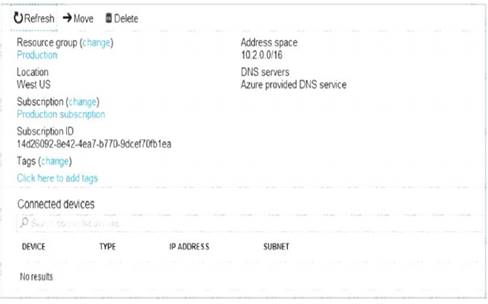- (Exam Topic 6)
Note: This question is part of a series of questions that present the same scenario. Each question in the series contains a unique solution that might meet the stated goals. Some question sets might have more than one correct solution, while others might not have a correct solution.
After you answer a question in this section, you will NOT be able to return to it. As a result, these questions will not appear in the review screen.
You have an Azure subscription that contains the virtual machines shown in the following table.
You deploy a load balancer that has the following configurations:  Name: LB1
Name: LB1 Type: Internal
Type: Internal  SKU: Standard
SKU: Standard Virtual network: VNET1
Virtual network: VNET1
You need to ensure that you can add VM1 and VM2 to the backend pool of LB1.
Solution: You create a Standard SKU public IP address, associate the address to the network interface of VM1, and then stop VM2.
Does this meet the goal?
Correct Answer:B
A Backend Pool configured by IP address has the following limitations:  Standard load balancer only
Standard load balancer only
Reference:
https://docs.microsoft.com/en-us/azure/load-balancer/backend-pool-management
- (Exam Topic 6)
You deploy an Azure Kubernetes Service (AKS) cluster named Cluster1 that uses the IP addresses shown in the following table.
You need to provide internet users with access to the applications that run in Cluster1. Which IP address should you include in the DNS record for Ousted?
Correct Answer:B
When any internet user will try to access the cluster which is behind a load balancer, traffic will first hit to load balancer front end IP. So in the DNS configuration you have to provide the IP address of the load balancer.
Reference:
https://stackoverflow.com/questions/43660490/giving-a-dns-name-to-azure-load-balancer
- (Exam Topic 6)
You have an Azure subscription that contains the resources in the following table.
To which subnets can you apply NSG1?
Correct Answer:C
All Azure resources are created in an Azure region and subscription. A resource can only be created in a virtual network that exists in the same region and subscription as the resource.
References:
https://docs.microsoft.com/en-us/azure/virtual-network/virtual-network-vnet-plan-design-arm
- (Exam Topic 1)
You discover that VM3 does NOT meet the technical requirements. You need to verify whether the issue relates to the NSGs.
What should you use?
Correct Answer:E
Scenario: Litware must meet technical requirements including:
Ensure that VM3 can establish outbound connections over TCP port 8080 to the applications servers in the Montreal office.
IP flow verify checks if a packet is allowed or denied to or from a virtual machine. The information consists of direction, protocol, local IP, remote IP, local port, and remote port. If the packet is denied by a security group, the name of the rule that denied the packet is returned. While any source or destination IP can be chosen, IP flow verify helps administrators quickly diagnose connectivity issues from or to the internet and from or to the on-premises environment.
References:
https://docs.microsoft.com/en-us/azure/network-watcher/network-watcher-ip-flow-verify-overview
- (Exam Topic 6)
You have an Azure subscription that contains the resources shown in the following table.
The Not allowed resource types Azure policy is assigned to RG1 and uses the following parameters:
§ Microsoft.Network/virtualNetwork
§ Microsoft.Compute/virtualMachines
In RG1, you need to create a new virtual machine named VM2, and then connect VM2 to VNET1. What should you do first?
Correct Answer:C
The Not allowed resource types Azure policy prohibits the deployment of specified resource types. You specify an array of the resource types to block.
Virtual Networks and Virtual Machines are prohibited. Reference:
https://docs.microsoft.com/en-us/azure/governance/policy/samples/